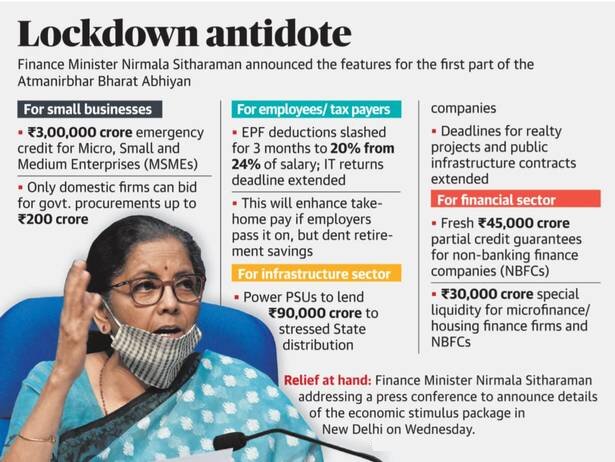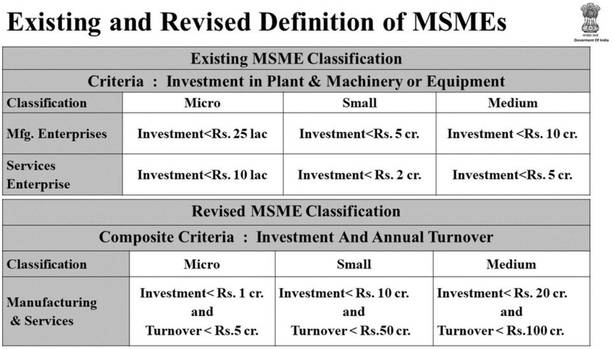Indian Economy
Economic Stimulus-I
- 14 May 2020
- 8 min read
Why in News
Recently, the Union Finance Minister announced liquidity measures for businesses, especially Micro, Small and Medium enterprises (MSMEs), as part of the first tranche of Atmanirbhar Bharat Abhiyan.
- The announced measures also form a part of the Rs. 20-lakh-crore economic stimulus package to deal with the Covid-19 pandemic.
- This economic stimulus includes both liquidity financing measures and credit guarantees.
Key Points
- Salaried Workers and Taxpayers:
- The deadline for income tax returns for the financial year 2019-20 has been extended, with the due date now pushed to November 30, 2020.
- The rates of Tax Deduction at Source (TDS) and Tax Collection at Source (TCS) have been cut by 25% for the FY 2020-21.
- The statutory Provident Fund (PF) payments have been reduced from 12% to 10% for both employers and employees for the next three months.
- NBFCs, Housing Finance Companies and Microfinance Institutions:
- Many of these institutions serve the MSME sector financially and will be supported through a Rs.30,000 crore investment scheme fully guaranteed by the Centre.
- Further, an expanded partial credit guarantee scheme worth Rs.45,000 crores also has been offered, of which the first 20% of losses will be borne by the Centre.
- For instance, if the government provides a 100% credit guarantee up to an amount of Rs 1 crore to a firm, it means that a bank can lend Rs 1 crore to that firm; in case the firm fails to pay back, the government will repay all of Rs 1 crore. If this guarantee was for the first 20% of the loan, then the government would guarantee to pay back only Rs 20 lakh.
- Power Distribution Companies:
- As these companies are facing an unprecedented cash flow crisis and thus will receive Rs. 90,000 crore liquidity injection.
- Real Estate and Contractors:
- Contractors (those dealing with the construction/ works and goods and services contracts) will get a six month extension for completion of work from all Central agencies, and also get partial bank guarantees to ease their cash flows.
- Registered real estate projects will get a six-month extension for registration and completion of Real Estate Projects under Real Estate (Regulation and Development) Act (RERA) with Covid-19 to be treated as a “force majeure” event.
- A Force Majeure (FM) means extraordinary events or circumstances beyond human control such as an event described as an Act of God (like a natural calamity).
- Global Tenders to be Disallowed:
- Indian MSMEs and other companies have often faced unfair competition from foreign companies and would be difficult to compete in the future due to Covid-19 pandemic.
- Therefore, global tenders will be disallowed in government procurement tenders upto Rs 200 crores.
Liquidity Measures for Medium, Small and Micro Enterprises (MSMEs)
- New Definition of MSMEs:
- The definition of an MSMEs has been expanded to allow for higher investment limits and the introduction of turnover-based criteria.
- Earlier MSMEs were defined on the basis of the limit of investment in machinery or equipment.
- The ‘turnover’ is the more efficient way to identify an MSME as it allows a lot of firms, especially in the services sector like mid-sized hospitals, hotels and diagnostic centres to be eligible for benefits as an MSME.
- There will be no difference between a manufacturing MSME and a services MSMEs.
- The definition of an MSMEs has been expanded to allow for higher investment limits and the introduction of turnover-based criteria.
- Infusion of Liquidity:
- Instead of directly infusing money into the economy or giving it directly to MSMEs,the government will offer credit guarantees for MSMEs.
- Emergency Credit Line: The collateral free loans of worth Rs. 3 lakh crores will be available for MSMEs. It will ensure access to working capital to resume business activity and safeguard jobs for 45 lakh MSMEs.
- The above measure is available for MSMEs that have an already outstanding loan of Rs. 25 crore or those with a turnover less than Rs 100 crore.
- The loans will have a tenure of 4 years and they will have a moratorium of 12 months (that is, the payback starts only after 12 months).
- Subordinate Debt Scheme : The loans of amount Rs 20,000 crore will be provided to MSMEs that were already categorised as “stressed”, or struggling to pay back.
- In this case, the government provides partial guarantee.
- Equity Infusion: Fund of Funds with corpus of Rs 10,000 crores will be set up which will provide equity funding for MSMEs with growth potential and viability.
Credit Guarantees to MSMEs
- Description:
- A Credit Guarantee Schemes (CGS) by the government assures the bank that its loan will be repaid by the government in case the MSME falters.
- Reasons for Introduction of CGS:
- Though, there was an option to pump liquidity via the banks but banks suspect any new loans due to rising Non-Performing Assets (NPAs).
- Thus, the government faced a dual problem where banks had the money but were not willing to lend to the credit-starved sections of the economy, while the government itself did not have enough money to directly help the economy.
- The credit guarantees solve dual issues faced by the government.
- Implications:
- Such CGS creates moral hazards as borrowers remain assured of paying back and the lender remains assured of receiving credit amounts. Subsequently, the government is forced to pay the amount.
Overall Implications of Economic Stimulus
- The measures announced during the first tranche of the economic stimulus focuses majorly on supply side measures, aimed at activating businesses in the MSME, real estate, NBFC sectors.
- In general, stimulus measures are aimed at boosting demand either by government spending on its own account or increasing disposable incomes of households through cash transfers or tax concessions.
- Indian economy needs both supply and demand side measures for the revival.






